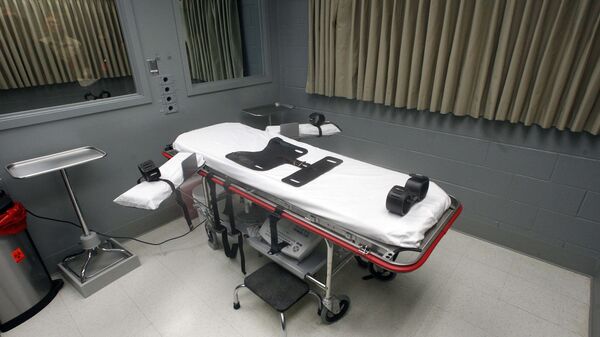Stack wrote two books on the death penalty before making his foray into documentary filmmaking. "Both are very heavily tilted against it, taking a hard look at the ‘innocence issue,' which in my estimation is… the signature debate point in [regards to] the death penalty that both the political left and the political right can agree upon. No one in their right mind wants to see an innocent person executed," Stack told By Any Means Necessary.
Stack hopes that his documentary will take its viewers beyond the "innocence issue," or criticism of the death penalty that focuses on the possibility of executing innocent people. "The systemic issues that we're dealing with, there's certainly racist overtones — very obvious racist overtones, classist overtones. There is an old expression: ‘nobody with capital gets capital punishment.' If you can afford a good lawyer you can beat the system," Stack said.
"Whether there are mistakes or not — even if it's very clear that the individual is guilty, can't we be better as a society in terms of the way we treat violent outliers?" Stack pondered.
Stack said that the objective of the documentary is to enlighten people on these issues, but to also stimulate discussion on a "a controversial issue that most people don't even want to think about."
"It's really difficult for people to wrap their arms around the depth of the problem, of all the dimensions that come with it. You hit people with numbers; they get numb," Stack explained. But once people can "see it through the eyes of people that have experienced the horror of an issue from multiple perspectives… that's when people will begin to relate to it on a gut level and really give it the serious thought that it deserves."
The documentary follows Vicky and Sylvester Schieber, the parents of a young woman who was raped and murdered in 1998. They "find it in their hearts to forgive the perpetrator of the crime to the extent that they fought to spare the life of their daughter's killer," Stack said, adding, "Every time I say those words, it sends a chill down my spine."
The second subject of the documentary is Karen Brassard, who was injured alongside her husband, daughter and family friends during the 2013 Boston Marathon bombing. "She allowed us to follow her thinking in real time over the course of about 18 months as she struggled with this very concept of ‘what is justice?'" Stack told Radio Sputnik. "On the one hand, [Dzhokhar] Tsarnaev is just 19 years old and Karen at the time had a 19-year-old son and she knows that 19-year-old boys don't always make the best decisions and she really didn't want to be a part of taking his life. And on the other hand, she thought: ‘Well, what is justice in this case?' — you know, what's the proper punishment for Tsarnaev?"
The film's name is derived from the case of one of the three main subjects of the documentary: Jerry Givens. Givens was the chief executioner for the state of Virginia, having conducted 62 executions, 37 by electric chair and 25 by lethal injection, through the course of his career. "He does the dirty work for all of us: whether you're for the death penalty or against the death penalty, it's human beings that have to carry out this awful administration of justice," Stack said.
The executioner "really represents a decaying criminal justice system and somebody who thinks through what he's done and is kind of trying to seek redemption through a change of heart and epiphany, and now speaks heavily against the death penalty," Stack said.
"Through his eyes, you realize, ‘Wow, administering justice — so-called justice — can destroy the human beings who are assigned to do our dirty work,'" Stack said.
The film also highlights the case of Earl Washington, a cognitively disabled black man who was wrongfully convicted for the rape and murder of a young woman. Washington spent more than 17 years in prison and was only nine days away from being executed by Givens when his execution was stayed. The film brings Washington and Givens together for an on-camera reunion.
"You know, I think the death penalty is emblematic of the worst of us and as a society, as individuals… how do we want to treat these very, very difficult issues? With compassion or not?" Stack said. "I come back to the idea that what we're trying to do here is get people thinking and get people talking about a subject they don't want to talk about… I believe it was [US Supreme Court Justice] Thurgood Marshall who said ‘the more people think about this issue, the more they'll come to the conclusion that the death penalty is not a just sentence.'"
"In the Executioner's Shadow" begins screening this week at American University in Washington, DC.


